简单句,复合句,并列句
简单句,并列句,复合句
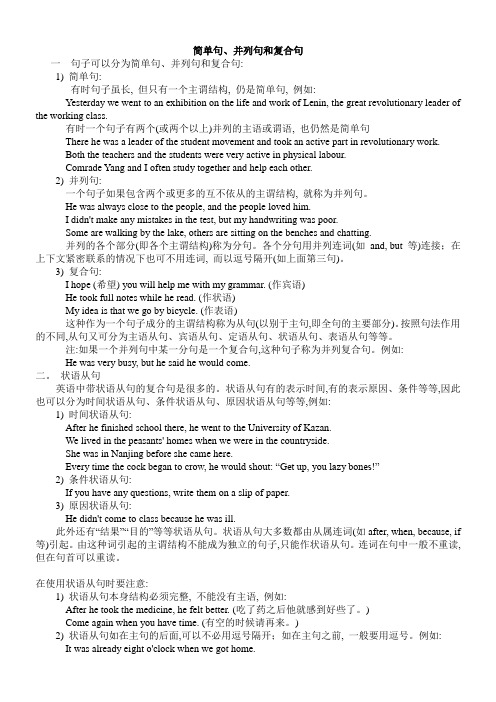
简单句、并列句和复合句一句子可以分为简单句、并列句和复合句:1) 简单句:有时句子虽长, 但只有一个主谓结构, 仍是简单句, 例如:Yesterday we went to an exhibition on the life and work of Lenin, the great revolutionary leader of the working class.有时一个句子有两个(或两个以上)并列的主语或谓语, 也仍然是简单句There he was a leader of the student movement and took an active part in revolutionary work.Both the teachers and the students were very active in physical labour.Comrade Yang and I often study together and help each other.2) 并列句:一个句子如果包含两个或更多的互不依从的主谓结构, 就称为并列句。
He was always close to the people, and the people loved him.I didn't make any mistakes in the test, but my handwriting was poor.Some are walking by the lake, others are sitting on the benches and chatting.并列的各个部分(即各个主谓结构)称为分句。
各个分句用并列连词(如and, but 等)连接;在上下文紧密联系的情况下也可不用连词, 而以逗号隔开(如上面第三句)。
3) 复合句:I hope (希望) you will help me with my grammar. (作宾语)He took full notes while he read. (作状语)My idea is that we go by bicycle. (作表语)这种作为一个句子成分的主谓结构称为从句(以别于主句,即全句的主要部分)。
简单句、并列句、复合句文档

简单句英语句型分类根据语法形式,即句子的结构,英语的句子可分为简单句、并列句和复合句。
基本形式简单句的基本形式是由一个主语加一个谓语构成。
其它各种句子形式都是由此句型发展而来,如五大基本句型:五大基本句型1.主语+谓语谓语一定是动词这种句型简称为主谓结构,其谓语一般都是不及物动词,例:Things change.事物是变化的。
Nobody went.没有人去。
--Did you go by sea?你们走的是海路吗?--NO,we flew.不,我们是飞去。
2.主语+连系动词+表语也叫做主系表这种句型称为主系表结构,其实连系动词在形式上也是一种谓语动词,但实质上表语成了谓语,例:Mr. Turner is an artist.特纳先生是位画家。
The milk went sour.牛奶变酸了。
She became a lawyer.她当了律师。
注:我们平常所说的be动词有两种含义:1、助动词的be;2、作为连系动词的be;3.主语+谓语+宾语宾语有两种:间接宾语和直接宾语这种句型可称为主谓宾结构,它的谓语一般多是及物动词,例:We never beat children.我们从来不打孩子。
My sister will fix everything.我姐姐会料理一切。
4主语+谓语+宾语+宾语这种句型可称为主谓宾宾结构,其谓语应是可有双宾语的及物动词,两个宾语一个是间接宾语,一个是直接宾语,例:He gave the book to his sister.他把这本书给了他的妹妹。
I'll write you a long letter.我将写给你一封长信。
5.主语+谓语+宾语+宾补所谓宾语补足语就是补充说明前面的宾语这种句型可简称为主谓宾补结构,其补语是宾语补语,与宾语一起即构成复合宾语,例:I found the book easy.我发现这本书不难。
(形容词easy作补语)I'll let him go.我将让他去。
句子结构:简单句,并列句,复合句
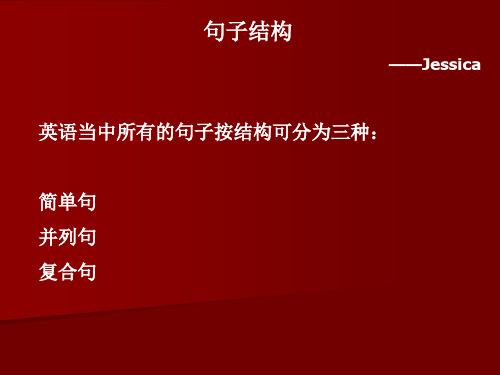
▲主语+谓语(vt.)+宾语
eg. I met an interesting person last year. 主 谓 宾(用定语修饰) 时间状语 Have you read the story about the witch yet? 助动词 主 谓 宾 介词短语 状语 He should look up the new words in the dictionary in advance. 主 谓 宾 介词短语 状语 My friend hasn't called me for a long time. 主 谓 宾 时间状语 They will put up a factory and a premise next year. 主 谓 宾 时间状语
但可以用连词and将两个或以上主语或动词合并为一个简单句 Eg. My mother loves rice. I love rice. 合并为 My mother and I love rice. 主语 谓语
We played games yesterday. We laughed yesterday. 合并为 We played games and laughed yesterday. 主语 谓语
♥用并列连词连接
表示连接:and/not only...but also.../neither...nor eg. It's summer and a lot of people swim in the sea Not only did he help me, but also he encouraged me. Neither have I seen her nor has he seen her. 表示转折:but/yet/while/however/still eg. He is from China, but he cannot speak Chinese. I hunt for jobs for months, yet I found nothing. The wife is crying, while the husband is smoking. It is raining heavily, still he won't go home. 表示选择:or/either...or/otherwise eg. Work hard, otherwise you'll be sorry. Hurry up, or we'll miss the train. Either you are mad or I am mad. 表示因果关系:for(原因)/so/therefore eg. The book didn't sell well, for it is not for children. I have no money, so I just had a window shopping. The water runs out, therefore I drank coffee.
简单句 并列句 复合句
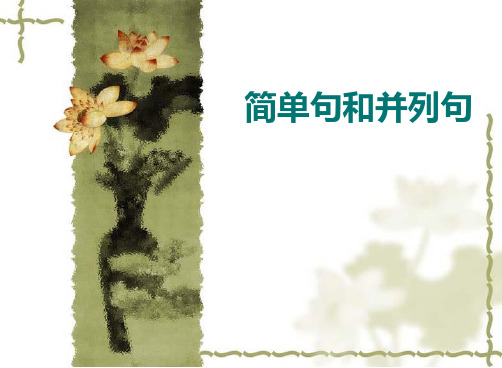
1. 陈述句(Declarative Sentences)
用来说明一个事实或陈述一种看法。例如: 1) Light travels faster than sound.
光比声传播速度快。(说明事实) 2) The film is rather boring.
这部电影很乏味。(说明看法)
要特别注意陈述句的否定结构
6. 状语 ( Adverbial )
常指修饰动词、形容词或副词的成分,修饰动词时 表示动作发生的时间、地点、目的或方式等;修饰 形容词或副词时表示它们的程度等。状语常由副词、 介词短语、动词不定式或分词短语等充当。 例如: 1. The miners work very hard. 2. She often helps Mike at school. 3. Hearing the news, he couldn’t help jumping.
3. 宾语 ( Object )
常指及物动词或介词后面使之意思完整的词或短语。 常由名词、代词、动词不定式或动名词短语等充当。 例如: 1. She has finished doing the experiment. 2. We like English and are good at it.
4. 表语 ( Predicative )
5)主 + 动 + 间宾 + 直宾 例如: My mother made me a new dress. 我母亲给我做了一件新衣裳。
IV. 并列句的常用连词
1. 我们常用并列连词and, not only…but also…等 连接联合并列句,用not only…but also… 时, 前面一句要用部分倒装 。例如: 1)Use your head, and you’ll find a way. 2)Not only does he want to come, but the students also need him.
简单句并列句复合句

能连接并列复合句的副词
• besides 而且,还有 • hence 由此,因此 • nevertherless然而 • moreoever加之,因此 • otherwise 否则,要不然 • then 然后,于是 • therefore 因此,要不然 • then 然后,于是 • therefore因此,所以 • thus 因而,从而 • i am not feeling very well today, otherwise i would do
• 第四种句型: • 主语+动词+间接宾语+直接宾语 • 如:He brings me cookies every day. • They gave him a watch.
• 第五种句型: • 主语+动词+宾语+宾语补足语 • 如:He asked me to answer this question. • We often see him play basketball alone.
• 如:The old woman lives alone, but she never feels lonely.
• we love peace but we are not afraid of war.
第三种:表示选择关系
• 此类并列连词有or, otherwise, either…or…等。
• 第二种句型: • 主语+动词+宾语 • 如:He loves his wife.
• We will always remember the junior high school life.
• 第三种句型: • 主语+连系动词+表语 • 如:I am a winner. • The music sounds nice. • We are in the classmate.
简单句、并列句和复合句
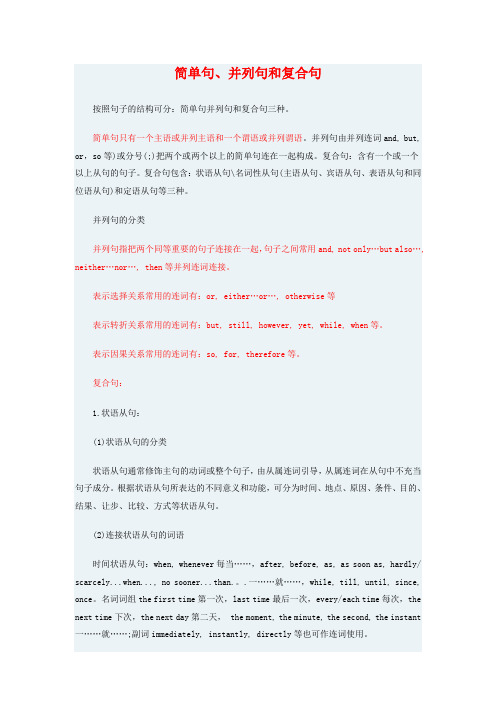
简单句、并列句和复合句按照句子的结构可分:简单句并列句和复合句三种。
简单句只有一个主语或并列主语和一个谓语或并列谓语。
并列句由并列连词and, but, or,so等)或分号(;)把两个或两个以上的简单句连在一起构成。
复合句:含有一个或一个以上从句的句子。
复合句包含:状语从句\名词性从句(主语从句、宾语从句、表语从句和同位语从句)和定语从句等三种。
并列句的分类并列句指把两个同等重要的句子连接在一起,句子之间常用and, not only…but also…, neither…nor…, then等并列连词连接。
表示选择关系常用的连词有:or, either…or…, otherwise等表示转折关系常用的连词有:but, still, however, yet, while, when等。
表示因果关系常用的连词有:so, for, therefore等。
复合句:1.状语从句:(1)状语从句的分类状语从句通常修饰主句的动词或整个句子,由从属连词引导,从属连词在从句中不充当句子成分。
根据状语从句所表达的不同意义和功能,可分为时间、地点、原因、条件、目的、结果、让步、比较、方式等状语从句。
(2)连接状语从句的词语时间状语从句:when, whenever每当……,after, before, as, as soon as, hardly/ scarcely...when..., no sooner...than.。
.一……就……,while, till, until, since, once。
名词词组the first time第一次,last time最后一次,every/each time每次,the next time下次,the next day第二天, the moment, the minute, the second, the instant 一……就……;副词immediately, instantly, directly等也可作连词使用。
简单句并列句复合句
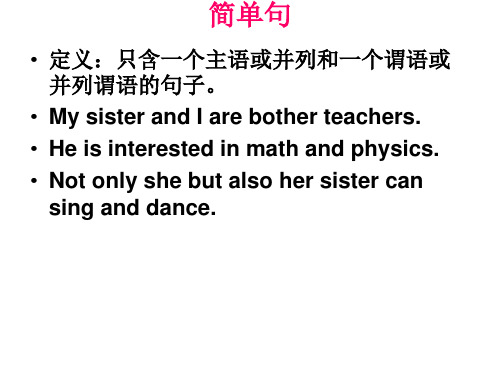
基本句型 四
S │Vt │ o(多指人)│ O(多指物)
1. She │ordered │herself │a new dress. 2. She │cooked │her husband │a delicious meal3. He │bought │you │a dictionary. 4. He │ gave │ me │ some ink. 5.I │showed │him │my pictures. 6. I │gave │my car │a wash. 7. I │told │ him │that the bus was late. 8. He │showed │me │how to run the machine. 3. He bought a dictionary for you.
表语从句
• 5. What he said is different from what he did.
定语从句
• A famous scientist from Beijing gave us a talk yesterday. • A famous scientist who came from Beijing gave us a talk as soon as we came to school yesterday. • The boy who broke the window is called Tom. • The meal that / which my mother cooked was delicious.
复合句 (名词性从句,定语从句和状语从句)
• 由一个主句和一个或一个以上的从句构成, 主句为主体,从句不能独立,只作句子的 一个成分。
名词从句
• 1. I don‟t believe what he said. 宾语从句 • 2. What he said isn‟t true. 主语从句 • 3. I don‟t believe what he said, because what he said isn‟t true. • 4.The trouble is that they have no money.
高考英语语法复习 ---简单句并列句复合句
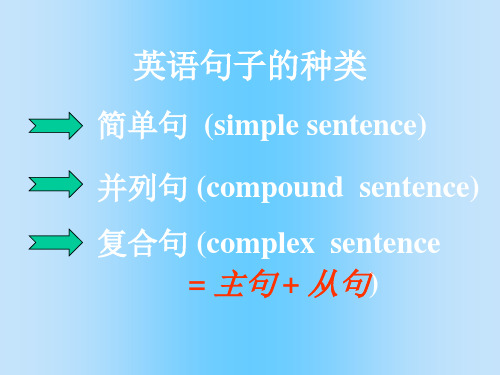
(武汉调研4月) Put yourself in situations where you will be forced to communicate in English, ___ you will see more progress over time. A. or B. so C. yet D. and (崇文4月) You must get up early in the morning, ___ we’ll have to leave without you A.and B. but C. or D. so
英语句子的种类
简单句 (simple sentence) 并列句 (compound sentence)
复合句 (complex sentence = 主句 + 从句)
简单句的五种基本句型
• 主语 + 不及物动词 ( S + Vi ) • 主语 + 及物动词 +宾语 ( S + Vt + O) • 主语 + 系动词 + 表 (S + LV + predicative) • 主语+双宾动词+间宾+直宾(S +Vt +O.indir+O. dir) • 主语 + 宾补动词 +宾语 +宾语补语 • (S + Vt. + O + O. compl) •There + be / stand/ lie / live...
其它平行结构:not…but…, either…or…, neither…nor, not only…but also…, would rather…than…(宁愿……不愿 ……), rather than(而不), as well as(既……也……)等。
- 1、下载文档前请自行甄别文档内容的完整性,平台不提供额外的编辑、内容补充、找答案等附加服务。
- 2、"仅部分预览"的文档,不可在线预览部分如存在完整性等问题,可反馈申请退款(可完整预览的文档不适用该条件!)。
- 3、如文档侵犯您的权益,请联系客服反馈,我们会尽快为您处理(人工客服工作时间:9:00-18:30)。
简单句,复合句,并列句鹿俊先江苏省沛县湖西中学 221611通过简单句,复合句,并列句之间的相互转换能够使学习者温故知新,在准确理解的基础上牢固掌握并灵活应用各种复杂的句型。
英语中各种句型间的相互转换常见以下几类:一、简单句←→复合句1、表示动作意义的名词、动名词短语或起名词的作用的不定式短语有时与名词性从句可以互相转变。
例如:His sudden death made us sad. ←→That he suddenly died made us very sad.His words deeply upset me. ←→what he said deeply upset me.The president’s attending the meeting himself gave them a great deal of encouragement. ←→It gave them a great deal of encouragement that the president attended the meeting himself.His coming back so soon was quite unexpected. ←→It was quite unexpected that he should come back so soon.What worried the child was his not being allowed to visit his mother in the hospital. ←→What worried the child was that he was not allowed to visit his mother in the hospital.It is necessary for us to learn how to use the computer. ←→It is necessary that we should learn how to use the computer.Our intention was to help you. ←→Our intention was that we should help you.I hope to become a teacher. ←→I hope that I will become a teacher.Don't forget to attend the lecture. ←→Don't forget (that) you should attend the lecture.I still remember being / having been taken to Beijing when I was a child. →I still remember (that) I was taken to Beijing when I was a child.I'm sure of his failure. ←→I'm sure (<of the fact> that) he will fail.2、某些动词的复合宾语——宾语+宾语补足语,与宾语从句可以相互转变。
例如:The doctor warned me not to eat oily food after the operation. ←→The doctor warned that I mustn't eat oily food after the operation.The managers would like to see the plan carried out the next year←.→The managers would like to see that the plan was to be carried out the next year.I find her easy to get along with. ←→I find (that) she is easy to get along with.The teacher required us to learn the text by heart. ←→The teacher required (that) we should learn the text by heart.在相应的被动语态句型中,主语+ 主语补足语与主语从句可以相互转变。
例如:They were requested to be ready by seven o'clock. ←→It was requested that they should be ready by seven o'clock.He is said to have studied abroad. ←→It is said that he studied / has studiedabroad.(此结构没有相应的主动形式。
也可以与下列相似句型一起记忆:There seemed to be nothing left to do except send for the doctor. ←→It seemed that there was nothing left to do except send for the doctor. / They seemed to be satisfied with the result of the experiment. ←→It seemed that they were satisfied with the result of the experiment. / I happened to be reading at the time. ←→It happened that I was reading at the time.)3、介词短语、不定式短语或分词短语作状语与状语从句可以相互转变。
例如:Having worked with children before, I know what to expect in my new job. ←→As I've worked with children before, I know what to expect in my new job.Having lived in China for years, Mr. Brown still can't speak Chinese well. ←→Mr. Brown still can't speak Chinese well although he has lived in China for years.Taking this medicine, you'll feel better. ←→If you take this medicine, you'll feel better.Unless being diligent, you will fail ←→If you aren't diligent / Unless you are diligent, you will fail.When completed, the museum will be open to the public next year. ←→When it is / has been completed, the museum will be open to the public next year.Though lacking money, his parents managed to send him to university. ←→Though they lacked money, his parents managed to send him to university.In spite of his great success, he does no feel satisfied. ←→Although he has great success/ Although he is very successful, he does no feel satisfied.She was unable to go on with her work because of her poor health. ←→She was unable to go on with her work because she was in poor health.We can do nothing without faith. ←→We can do nothing if we have no faith.Break the glass and push the red button in case of fire. ←→Break the glass and push the red button in case there should be a fire.But for / without your help, I couldn't have finished the task on time. ←→If it hadn't been for your help, I couldn't have finished the task on time.Hoping to sleep / In the hope of sleeping / To sleep late in the morning, Bob turned off the alarm. ←→Bob turned off the alarm so that / in order that he could sleep late.Having walked / After walking for five hours, we were almost exhausted. ←→when we had walked / After we (had) walked for five hours, we were almost exhausted.Used economically, one tin will last for at least six weeks. ←→If it is Used economically, one tin will last for at least six weeks.Walking in the street, I met an old friend of mine. ←→While / When I was walking in the street, I met an old friend of mine.The bridge is wide enough / so wide as for six cars to pass side by side. ←→The bridge is so wide that six cars can pass side by side.He is too young to join the club. ←→He is so young that he can't join the club.Weather permitting, we will visit the Great Wall tomorrow. ←→If the weather permits, we will visit the Great Wall tomorrow.其中一些由连词引导的副词、不定式短语、分词短语、介词短语作状语也可以看作状语从句的省略。
